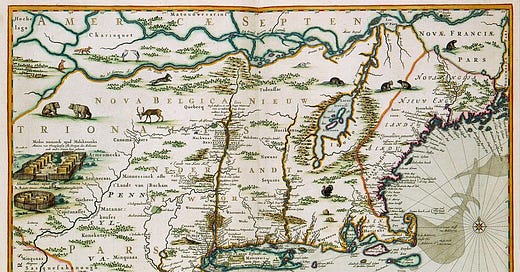Samuel Henry Rose’s great grandfather, Captain Arien Alderts Roosa Sr. (1645-1725), was born in the Netherlands, in the village of Herwijnen, and emigrated across the Atlantic to New Netherlands in 1666 on the Bonte Koe (Spotted Cow). The New Amsterdam History Center website lists the ship as sailing from Amsterdam, April 15, 1660, to arrive at New Amsterdam, New Netherland, with a passenger list that included “Albert Heymans (Roosa), from Gelderland, agriculturist – and wife, Weilke de Jonge, and eight children ages 2, 4, 7, 8, 9, 14, 15 and 17 years [.]” Arien Alderts Roosa, seventeen years old. Two years later, according to Wikitree, “…he was granted a large tract of land in Dutchess Co., NY, referred to as the ‘Roosa Patent’ and containing about one thousand five hundred (1,500) acres opposite Roundout Creek near Kingston and extending along the bank of the Hudson River.” They landed in New Netherlands just in time for the second half of the “Esopus Wars,” a conflict between Dutch settlers and the Esopus, a group of Lenape people indigenous to the Catskill Mountains of what is now Upstate New York. The conflict had been going on for some time, and by the time Captain Roosa Sr. arrive, it was enough that it cemented distrust from the settlers of any indigenous people, and most likely prompted the Dutch to cede New Netherland to the English. Once out of their hands, as of September 1664, the English, according to Wikipedia, “redrew the boundaries of Indian territory, paid for land that they planned to settle, and forbade any further settlement on the established Indian lands without full payment and mutual agreement.” It was into this that Captain Roosa Sr. and his family would land.
The curiosity of the New Netherland settlement, a colonial province geographically centred around the Hudson River, New York Bay and the Delaware Valley, that officially existed for less than seventy years: from 1609 to 1674. “Knickerbocker Dutch,” as their descendants are called, a term I hadn’t heard before. Fought with the locals enough that it broke their whole settlement. All part of the Republic of the Seven United Netherlands. This new fact of my Dutch ancestry, of which I had no idea. These new facts of these lineages across early America. What percentage is this.
Captain Arien Alderts Roosa Sr., who had already begun to adapt the surname Rose. How many greats between him and I, you might ask. And I would say: it depends.





New York continues to display its Dutch heritage in many local place and street names. Even the name of its NBA team, the Knicks, is a shortened form of the plural of "Knickerbocker".